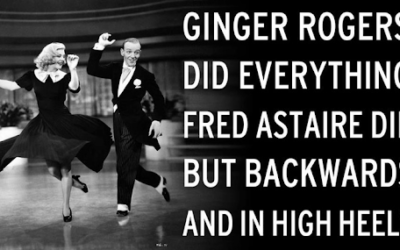It’s a simple question that I don’t think we women ask ourselves enough: why can’t we decide what to wear by ourselves? Burkini or miniskirt, so to speak.
It seems that women are “managed” in their fashion decisions to wear what’s hot, what’s hip, or what’s appropriate. Surprisingly, there aren’t a lot of articles or books about clothing and colors that are more flattering for one’s body type, personality or even personal coloring as compared to what’s “trendy.” I’ve recently noticed that such pieces are often misinterpreted by women as being “shaming.” I think this happens as a knee-jerk response to being highly managed. There are too many expectations from the outside (i.e., the culture) about what’s appropriate for work, for school, for one’s age, for one’s weight, for one’s role, etc. As a result, I don’t believe that adult women feel they have a lot of freedom when it comes to deciding what to wear; at least not without a chorus of voices in their head trying to tell them otherwise.
How deep does this managing go? Let’s explore two extreme but very real situations:
- Women ordered to disrobe for wearing too much clothing
- Women needing to change or not allowed to fly for wearing too little clothing
Extreme 1: Women ordered to disrobe for wearing too much clothing
The French chose to address their “Islamic extremist problem” by writing a law banning the burkini. From their perspective, a clothing change would help these women more quickly adopt to French secular life.
The consequences of this thinking turned tragic. This video caused worldwide outrage:
It is disrespectful to order any woman to disrobe. How is this representative of a society that claims it is a modern, secular nation that values open-mindedness and women’s empowerment?
Sure, there are implications of women’s clothing choices in Islam. Some women who choose to cover are considered to be more pious than those who do not. That is an argument for Muslims and Islamic scholars to address, not this blog post. However, the existence of that discussion proves how widely women’s clothing choices are managed – and how few options they truly possess.
Extreme 2: Women needing to change or not allowed to fly for wearing too little clothing
Every so often, we hear in the news a story how an airline flight attendant judged the outfit of a woman as “inappropriate” and would proceed to make her change or not allow her to fly.
A woman flew the first leg of her trip without any problems; it was the second leg of the trip where the flight attendant forced her to buy and wear pajama bottoms. What’s troubling is that this article made a point to mention that the woman worked as “burlesque dancer.” It was as if her profession justified her decision–and the airline’s actions. It shouldn’t matter what she does for work. She made a choice and was covered and fashionable. The flight attendant overreacted.
The airline did acknowledge that what happened was wrong. But the message that women need to defend their clothing choices, and professions, remained.
And this isn’t a new occurrence. A few years back, a woman who wore the outfit below was also told by an airline to change what she was wearing to be more family appropriate. To me, she looks like she is ready to go out for a great night at a beach town. However, the flight attendant made her try to cover up and embarrassed her. Like the “burlesque dancer,” her job as a waitress at Hooters was needlessly included in the write-up as an excuse as to why she made those fashion decisions.
Apparently, if someone believes that you are wearing too little you are thrown off a plane. And if you wear too much on the beach, you are told to take off your clothes. It’s like women can’t win and yet another double bind we find ourselves in.
Why do people care so much about what women do and look like? Where does this come from?
I enjoy trying to track down the origins of belief systems. Much of what I think is happening today are based on ancient beliefs regarding women.
I researched the ancient Egyptians and learned that women had many legal rights, similar to modern women. In Mesopotamia, however, women’s rights decreased over the years due to inheritance laws. There was also reference that the decline of goddess worship contributed to women losing their power.
However, it wasn’t until the Greeks were at their pinnacle when women “were largely regarded as inferior creatures scarcely more intelligent than children;” implying that women needed a parent-figure and were required to be controlled in some way. The Romans continued these beliefs which continued to the present. Some quotes to validate the Greek’s perception:
Aristotle said that man is by nature superior to the female and so the man should rule and the woman should be ruled.
Pericles: “A woman’s reputation is highest when men say little about her, whether it be good or evil.”
—What Athentian Men Said about Women
Today we consider these perspectives to be arcane. However, their echoes are still very active in our belief structures as indicated by the culture responses to women’s clothing choices above.
Why do we women continue allowing this to happen to us today?
All of us, men and women, have been conditioned over millennia to believe that women are childlike and they need to be managed. Many of us no longer actively accept this belief. However, many women are realizing the power that we do have to change these beliefs in society today. What are some ways we can do this?
- Respect other women’s choices (and stop belittling choices by other women that we wouldn’t make for ourselves)
- Stop gossiping (see #1)
- Be more accepting of different perspectives
- Become a role model for our children to follow in how to respect others’ choices when they differ from our own
We also need help from men to make this change. Men who see women as equals need to be more visible role models for other boys and men to demonstrate how women should be treated with respect, regardless of what they wear.
Once we break free from these ancient beliefs about women being children who need to be told what to do and how to dress, no one will care what women wear. We’ll have ownership of ourselves and will not need to be “managed.” That’s when true freedom will emerge for women’s lives beyond our clothing choices.
Guide to Women in Leadership
Organizations with women in their executive suites regularly out-perform others. Yet rising female executives (and their mentors) are frustrated at how hard it is to break through the glass ceiling. In this extensive guide, Executive Coach Dana Theus shares her tried and true strategies to help women excel into higher levels of leadership and achieve their executive potential.









